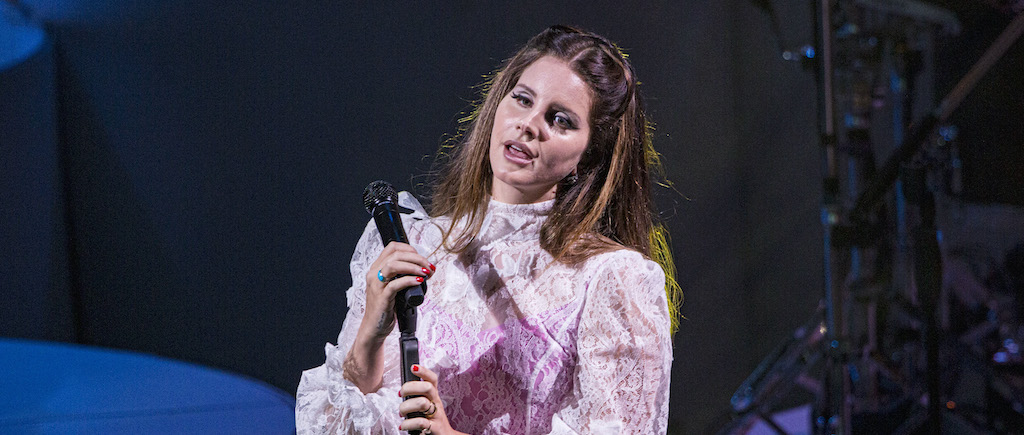After nearly a full day of being called a “Karen” online by commenters who took issue with her open letter to the music industry, Lana Del Rey responded, claiming her statement had “nothing to do with race” despite mostly naming Black and Latina women (and Ariana Grande).
In a comment on her original post, wherein she erroneously compared the critical and commercial reaction to her music to that of her peers’ material, she defied the characterization of her letter as “racist,” writing, “This is sad to make it about a WOC (women of color) issue when I’m talking about my favorite singers. I could have literally said anyone but I picked my favorite f*cking people.”
She pointedly noted her issue with a climate of political correctness, without saying as many words, griping, “This is the problem with society today, not everything is about whatever you want it to be. It’s exactly the point of my post — there are certain women that culture doesn’t want to have a voice. It may not have to do with race — I don’t know what it has to do with. I don’t care anymore but don’t ever ever ever bro call me racist that is bullsh*t.”
.@LanaDelRey responds to backlash over Instagram post about her industry struggles, says she didn’t intend to call out women of color:
“I could’ve literally said anyone but I picked my favorite fucking people…don’t ever ever ever bro call me racist that is bullshit.” pic.twitter.com/DCjYd6FqKD
— Pop Crave (@PopCrave) May 21, 2020
Lana left a “final note” as well, punctuating her comments with one more that attempted to clarify her meaning: “When I said people who look like me — I meant the people who don’t look strong or necessarily smart or like they’re in control, etc. It’s about advocating for a more delicate personality, not white women — thanks for the Karen comments tho. V helpful.”
.@LanaDelRey adds one “final note” on the controversy surrounding her Instagram post:
“It’s about advocating for a more delicate personality, not for a white woman – thanks for the Karen comments tho. V helpful.” pic.twitter.com/Y8tvL9Sybk
— Pop Crave (@PopCrave) May 21, 2020
Unfortunately for Lana, in her attempt to defend herself, she may have proved the critics correct. I don’t think anyone disputed or misconstrued her point. The problem is that her point was made at the expense of mostly women of color — particularly Black ones — and against a mountain of evidence to the contrary. As she says, she could have named any number of wilting, “delicate” personalities and they have still experienced just as much — if not more — criticism as her. But by naming those women specifically, she compared their struggles to hers, erasing those struggles, minimizing their experiences, and reducing their music to a narrow range of emotions and topics while inflating her own.
And not for nothing, at its most literal reading, her lament that “Doja Cat, Ariana, Camila, Cardi B, Kehlani and Nicki Minaj and Beyoncé have had number ones with songs about being sexy, wearing no clothes, f*cking, cheating, etc.” is flat-out wrong no matter how you dice it. Removing Kehlani from the equation, as she’s never had a No. 1 on the Billboard albums or Hot 100 charts, even the songs that have gone No. 1 from the others aren’t about being sexy or sex. The most recent entry, “Stuck With U,” is about the doldrums of an established relationship, while its immediate predecessor “Say So” is about missing out on a mutual attraction because the guy is too shy to approach. Beyonce’s last solo No. 1 was specifically about demanding no less than a ring to prove fidelity, and “Bodak Yellow” made more of Cardi retiring her clear heels to the Starlets rafters than “being sexy.” That doesn’t lend itself too well to her point that she loves their music.
Lana’s complaints stem from her perceived poor treatment at the hands of the music journalism establishment, without acknowledging that all of her peers have endured the same — many while suffering through circumstances Lana herself would never be forced to experience. For instance, she wouldn’t be subjected to the double standards of colorism. We know she doesn’t mean she deserves better for being white. But by failing to recognize her privilege and holding onto years-old imagined slights — especially just months after releasing a universally-acclaimed project — she truly is acting like a archetypical, entitled white lady and earning every “Karen” tweet that comes her way.







